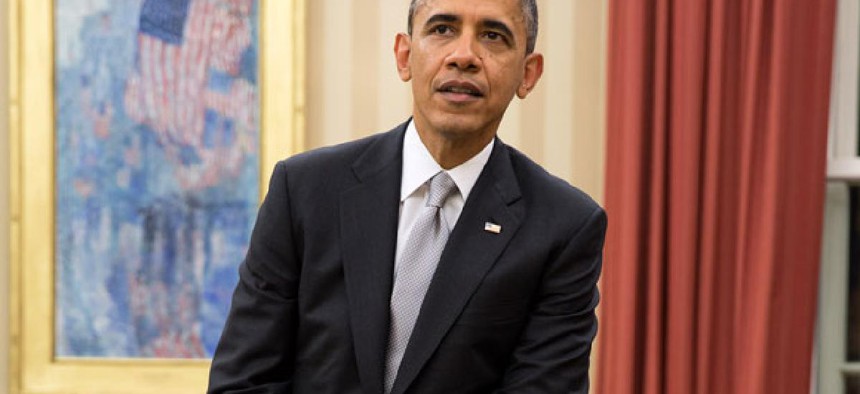
White House
It’s Obama’s Economy—at Last
We only seem to be back. It’s a far less equal economy--and big dangers loom for the president’s legacy.
For most of his first term, President Obama successfully sold a line to the public that economists will tell you is, at least in part, intellectual snake oil. He managed to blame our historically slow economy almost entirely on President George W. Bush. Polls taken right after the 2012 election showed that one of Mitt Romney’s biggest failures—and the GOP presidential candidate had staked almost everything on this point—was persuading U.S. voters otherwise.
But this week’s dramatic economic news, timed with the start of Obama’s second term, suggests that the political debate, if not the actual economy, is at an important milestone. On Wall Street, the Dow Jones industrial average reached new levels, shooting well above 14,000 and exceeding the closing records set in October 2007 just before the Big Crash. On Friday, a new jobs report finally gave Obama what he's wanted for four years: an unemployment rate that's below where he started as president, 7.7 percent. The Labor Department said nonfarm payrolls vastly outpaced expectations by increasing 236,000 in February, dropping the unemployment rate to the lowest level since December 2008, from 7.9 percent in January. Also this week, the Federal Reserve Board reported that Americans have recovered the staggering $16 trillion lost in wealth since the recession.
So, let’s call it, folks: As of March 8, 2013, this has become Obama’s economy.
It’s been a good week, and his acolytes are crowing: ‘Damn is that a good jobs report,’ former chief economist Austan Goolsbee tweeted. ‘Woot woot!’ House Speaker John Boehner, struggling to put some bad spin on a bust-out week of economic news, reminded everyone, “Unemployment in America is still way above the levels the Obama White House projected when the trillion-dollar stimulus spending bill was enacted.” Shades of the Romney campaign! Pretty lame.
But the harshest truths about the Obama economy are not ones Republicans would be eager to highlight. First, things are not really as good as the numbers suggest, and they are all but certain to get worse. If the $85 billion in cuts in the federal budget sequester go through as planned, gross domestic product will slow 0.5 percent, and about 750,000 jobs could be lost by the end of the year, the Congressional Budget Office says. The big numbers on Wall Street are also deceiving, says Harvard economist Kenneth Rogoff, who along with coauthor Carmen Reinhart tracked 800 years’ worth of economic recoveries in a landmark 2009 book, This Time Is Different: Eight Centuries of Financial Folly. “One of the paradoxes we point out in our book is that very often the equity markets reach and surpass previous levels within a few years, despite the fact that the economy takes decades to recover,” Rogoff said in an interview.
In addition, this is a very different American economy than the one we thought we had before the recession, and not in a good way. It’s not just that 7.7 percent unemployment is still very high and something of a grim new “normal,” along with still-high long-term unemployment. The problem is also that we’ve ended up with a far less equal economy. And there is little prospect of a consensus over tax reform or deficit reduction that will change that, no matter how many dinners Obama arranges with leading Republicans, like the one this week.
“The recovered wealth – most of it from higher stock prices – has been flowing mainly to richer Americans,” the Associated Press reported. This corroborates earlier data from prominent economists such as Emmanuel Saez of the University of California (Berkeley), whose work has shown that the wealthiest 1 percent of the country actually made out better, in percentage terms, during Obama's "recovery" than they did from 2002-07 under Bush.
Even the high Dow numbers conceal a darker truth about inequality and a still-ailing economy beset by bottomed-out interest rates that make bonds unattractive. “Those low interest rates are the sign of an economy that is nowhere near to a full recovery from the financial crisis of 2008, while the high level of stock prices shouldn’t be cause for celebration; it is, in large part, a reflection of the growing disconnect between productivity and wages,” Paul Krugman writes in The New York Tiimes.
In addition, Wall Street, the culprit behind the last disaster, may be at least as hard to rein in as it was four years ago. On the positive side, results of "stress tests" this week showed that 17 of the nation’s 18 largest banks will survive even if the economy plummets 5 percent and the Dow Jones industrial average falls to 7,221.7. But there is a new frothiness in the market that worries close watchers such as Neil Weinberg, the editor-in-chief at American Banker, who see new temptations abroad to underprice risk, coming at the same time that even Attorney General Eric Holder is warning that the biggest banks have grown not only too big to fail, but too big to prosecute. (In testimony before the Senate Judiciary Committee on Wednesday, Holder delivered an implicit rebuke to his former Cabinet colleague, Treasury Secretary Timothy Geithner, who permitted Wall Street to resurrect itself in what is largely its former image.)
So, yes, this is sure to be seen as Obama’s economy now. And while many of the trends are upward, in other respects what is being revealed now is the inadequacy of his first-term responses. A few years ago, some pundits, persuaded by the expert spinning of first-term economic adviser Lawrence Summers and Geithner, bought the Obama line that between the president's stimulus plan and his health care reforms, he was rectifying economic inequities that have grown since the Reagan era. The health care law, wrote David Leonhardt of The New York Times in 2010, amounted to “the federal government’s biggest attack on economic inequality since inequality began rising more than three decades ago.”
But Saez says Obama-era changes such as the health care surcharge on upper incomes, along with an increase in top tax rates back to the Clinton level, will have only minor impacts, especially relative to the changes that occurred after the New Deal. “It’s a medium-to-small-size change that, in my view, is not going to dramatically lead to a deconcentration of pretax income,” he said in a recent interview.
So, there’s little time to crow. Obama has his work cut out for him if he wants “his” economy to look like a positive legacy four years from now.







